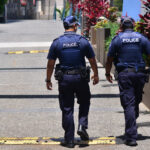22-Year Old Woman Strip Searched In Front of Shop Window

Twenty-two year old Teleaha Bower was with her partner last month, when she was approached by two undercover male police officers outside a pawn shop in St Mary’s and told she would be strip searched.
She says the officers claimed there had been a break-in nearby and suspected her involvement in the offence.
She says the officers emptied the entire contents of her handbag onto the ground, then forced her to face the shop’s front window, in full view of a man inside, and told to lift her clothing to reveal her torso and upper body.
She told the officers that she wanted to contact her father, but says they refused, then confiscated her phone.
“The worst part was it was two male police officers and they could just do it anywhere”, she told the media.
Strip-searching girls
Figures obtained by The Redfern Legal Centre show that 122 females under the age of 18 have been subjected to the degrading process of a strip-search recently.
And the Law Enforcement Conduct Commission (LECC) has heard of the humiliation and fear experienced by a 16-year old girl as she was illegally strip searched upon entering the Splendour in the Grass Music Festival in Byron Bay last year.
Reports of illegal searches
There are an ever-increasing number of reports on mainstream police officers acting illegally by failing to comply with the requirements of Part 4, Division 4 of the Law Enforcement (Powers and Responsibilities) Act 2002 (the LEPRA). The Part contains seven sections which set down the rules applicable to strip searches, including:
Section 31 which permits strip searches only in cases where “the seriousness and urgency of the circumstances make the strip search necessary”,
Section 32 which stipulates that the “privacy and dignity” of those being searched must be preserved, requiring police officers to:
- tell the person being searched why it is necessary to remove their clothing,
- undertake the procedure in a way that provides reasonable privacy,
- do it as quickly as possible,
- conduct the least invasive procedure required
- not search the genital area of the breasts of a woman or transgender person identifying as a woman, and
- have an officer of the same sex as the person searched undertake the search, and
Section 33 which says that officers must, “as far as is reasonably practicable”:
- conduct a strip search in a private area,
- not conduct the search in the presence or in view of a person of the opposite sex of the person being searched,
- not conduct the search in view of anyone not necessary for the purposes of the search, and
- have a parent or guardian of a child present when he or she is being searched.
There have been reports of police partially strip searching a 13-year old boy in public, randomly strip searching female protesters, and subjecting a disproportionately high number of Aboriginal youths to the procedure.
Earlier this month the Sniff Off Facebook page, which is operated by the Greens Party had images of police strip searching a train commuter at a station in Sydney without a proper privacy screen.
There have even been reports of police officers strip-searching a toddler – an act that is prohibited under section 34 of the LEPRA which stipulates that “[a] A strip search must not be conducted on a person who is under the age of 10 years.”
Police watchdog has insufficient funding and no disciplinary power
But a matter of significant concern is that the LECC is so under-resourced in our state that it is only able to properly investigate around 2% of the thousands of complaints against police referred to it.
What’s more, the organisation does not have power to discipline police officers; it can only make recommendations for action to be taken. And where it finds that an officer engaged in serious misconduct – including crime or corruption – the body will normally refer matters back to the police to consider disciplinary action against their own officers – a situation where police are essentially ‘policing themselves’ without adequate oversight or accountability.
State-sanctioned sexual assault
Greens MLC, David Shoebridge, is a vocal opponent of police abusing strip search powers.
Mr Shoebridge recently told Sydney Criminal Lawyers that “the bulk of NSW police who are forcing people to undergo strip searches don’t understand the law, and are regularly breaching it”, stating “strip searches are effectively a form of state-sanctioned sexual assault”.
Dramatic increase in strip searches
Data shows that ‘field’ strip searches in New South Wales – which are searches other than those conducted in police stations – increased by almost 47% over just four years. And on average, the searches turned up nothing illegal more than 60% of the time.
The procedure is now firmly in the spotlight, and is the subject of inquiry by the LECC.
There is also vocal opposition to the increase in strip searches by the Greens Party, The Redfern Legal Centre (RLC) and the general public who are becoming increasingly aware that they – or members of their family – are increasingly likely to face the humiliating procedure at the hands of police officers.
The Greens and RLC have called for police to be brought to account for their widespread illegal conduct as well as an overhaul of strip search laws generally, to make it crystal clear that subjecting people to such searches without a proper basis will have real consequences.








